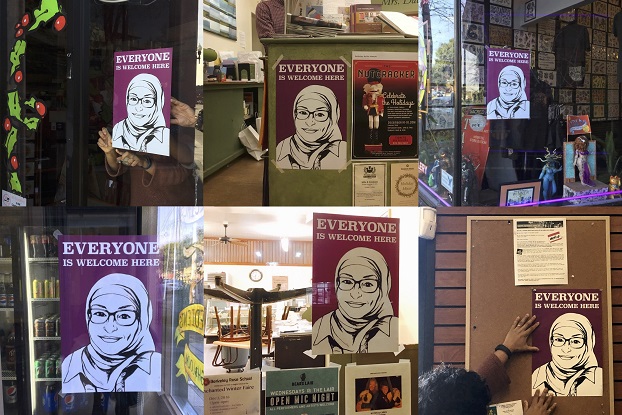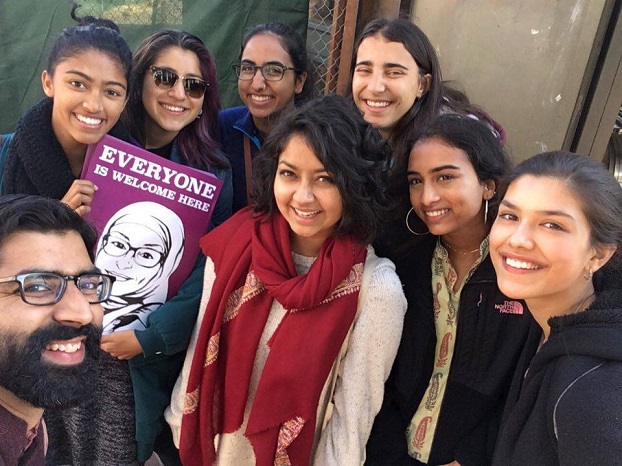
The tiny city of Berkeley, California saw at least 14 reported incidents of hate in the first 15 days since the election of Donald Trump. Recently, a group of South Asian Berkeley residents — three of whom have personally experienced post-election hate — hit the streets to respond to the unexpected climate of fear, armed only with hope and posters.
Since the elections, individuals and communities across the US have experienced a marked increase in racist and bigoted attacks. The Southern Poverty Law Center documented 867 hate incidents across the US in the first 10 days after the election — and the number of unreported incidents is likely several times higher.
Berkeley, California is often considered a liberal bastion, across the country and by its own denizens. Unfortunately, Berkeley is not immune to the pandemic of aggression and hate that has gripped this nation. Most disturbing is that in Berkeley, these incidents have not been organized rampages by right-wing racist groups; they have been unexpected attacks by neighbors, by bystanders, by those from whom we expect safety and security.
The attacks include the horrifying story of Berkeley local Asma Mohseni, who was walking with her toddler when a man began following her, screaming, “You don’t even speak English, go back to your fucking country, I’m going to kill you.” Mohseni pleaded for help, only to have a bystander yell at her too and walk away. Other witnesses eventually intervened, but the man continued to yell more racial slurs, backing her up against a wall, and threatening to punch her head. Thankfully, Mohseni and her child escaped without injury. She describes this incident in Berkeley as the worst ethnically motivated aggression she’s ever experienced, far worse than what she faced living on the East Coast after 9/11.
On Sunday, December 4, 2016, a group of South Asians came together to take back the streets. Members of UC Berkeley’s South Asians for Social Justice, the Alliance of South Asians Taking Action, and friends spread out across Berkeley to launch a visible response, following up on community safety interventions coming out of UC Berkeley’s Muslim community.
We visited stores across four neighborhoods in Berkeley, carrying copies of a poster of a smiling woman in hijab from Oakland, California. The poster, designed by Oakland artist Micah Bazant in collaboration with Sabiha Basrai of ASATA, bears a simple message: “Everyone is welcome here.”
Within a matter of a few hours, we had over 50 of the posters displayed in shop windows across Berkeley. The process was overwhelmingly affirming and positive: most of the establishments we walked into were supportive, especially the locally-owned businesses.
People of color owners and employees generally needed no convincing. One Muslim business owner shared stories of the kind of xenophobia he’d been experiencing after the election from some of his own customers. Most business owners and employees were shocked at the data we were providing them, about the number and diversity of incidents that had already occurred. We all agreed that for Berkeley to be a real sanctuary city, it needs sanctuary spaces that can be used as refuge when people’s physical or emotional safety feels threatened.
Posters aren’t enough. Members of ASATA are working on a variety of fronts, including gathering data on and responding to hate incidents, anti-immigrant and anti-Muslim policy proposals, and the wide variety of threats to our community’s people and institutions. But we and our allies will continue to use posters and other forms of art, to make our faces visible on the streets, share opportunities for allies to show their solidarity, and support Bay Area cities in becoming safer for all of us.

Resources for local action
- Want to do a poster campaign? You can download the posters here.
- Spread the facts about hate incidents across the country and how the “Trump Effect” is impacting schools
- Talk to the media — see the Desi Letters Project for some sample op-eds
- Don’t be a bystander — learn how to stand up against harassment and respond to racist bullying in school
- Donate to organizations like SAALT, which is working to keep our communities safe
- Report hate when it occurs (you can report the same incident to multiple sources)
- Report hate incidents to the local city, university, and/or police if and when it’s safe to do so
- Report all hate incidents to the SPLC
- Report anti-South Asian, Sikh, Muslim, and Arab hate incidents to SAALT
- Get help with anti-Muslim hate crimes from CAIR
- Get help with anti-Sikh hate incidents from the Sikh Coalition
* * *
Anisha Chemmachel is a student at UC Berkeley and is co-director of South Asians for Social Justice. Anirvan Chatterjee co-curates the Berkeley South Asian Radical History Tour. Anasuya Sengupta co-leads Whose Knowledge?, a global campaign to make the internet for and from us all.












